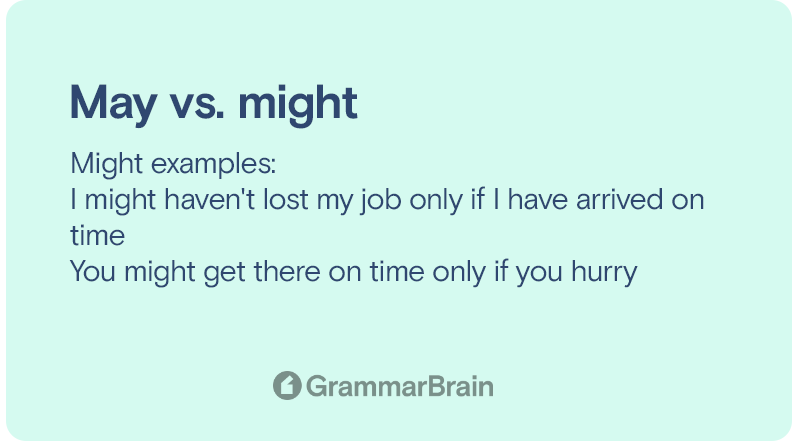May Vs Might Which To Use Grammar Examples Grammarbrain

May Vs Might Download Free Pdf Grammatical Tense Perfect Grammar Both the words may and might clarify the main verb, but for granting permission, you only should use ‘may’, and for highlighting possibility, use ‘might.’. Learn the difference between the words may and might and how to use each of them correctly in a sentence so your writing always looks polished.

May Vs Might Which To Use Grammar Examples Grammarbrain Learn when to use “may vs might” with clear grammar rules and examples. perfect your writing with ease. And there you have it — a comprehensive guide to may versus might. remember, the key is in the nuance: may carries a sense of probability or permission, often more formal or certain, while might introduces a shade of doubt or lesser likelihood. First off, when we talk about possibilities, “may” comes into play by suggesting that something might happen. for example, if you say, “it may rain later,” you’re not sure if it will rain, but it’s a possibility. on the flip side, “may” is also how we ask for or give permission formally. Use “may” in the present and “might” in the past. generally speaking, we use “may” when we are speaking about something that is happening in the present, using the present tense of the verb. for example: • i may do my homework tonight. (present tense) • she may take all of the staff to a celebration dinner after work. (present tense).

May Vs Might Which To Use Grammar Examples Grammarbrain First off, when we talk about possibilities, “may” comes into play by suggesting that something might happen. for example, if you say, “it may rain later,” you’re not sure if it will rain, but it’s a possibility. on the flip side, “may” is also how we ask for or give permission formally. Use “may” in the present and “might” in the past. generally speaking, we use “may” when we are speaking about something that is happening in the present, using the present tense of the verb. for example: • i may do my homework tonight. (present tense) • she may take all of the staff to a celebration dinner after work. (present tense). In this guide to “might vs may,” you’ll learn the real difference between the two—covering their meanings, usage rules, real life examples, and even common mistakes to avoid. Choose "may" if you're asking for permission or indicating a real possibility based on present circumstances. choose "might" when you're suggesting a lower probability, discussing hypothetical scenarios, or future uncertainty. May and might are modal verbs. they can normally be interchanged without a significant difference in meaning however might often implies a smaller chance of something happening (when expressing possibility). With “may” and “might,” the meanings to express permission and possibility are similar, and some people use them interchangeably. however, “may” is mostly used in the present and future tenses, while “might” is often used in the past when expressing possibility.

May Vs Might Which To Use Grammar Examples Grammarbrain In this guide to “might vs may,” you’ll learn the real difference between the two—covering their meanings, usage rules, real life examples, and even common mistakes to avoid. Choose "may" if you're asking for permission or indicating a real possibility based on present circumstances. choose "might" when you're suggesting a lower probability, discussing hypothetical scenarios, or future uncertainty. May and might are modal verbs. they can normally be interchanged without a significant difference in meaning however might often implies a smaller chance of something happening (when expressing possibility). With “may” and “might,” the meanings to express permission and possibility are similar, and some people use them interchangeably. however, “may” is mostly used in the present and future tenses, while “might” is often used in the past when expressing possibility.
Comments are closed.